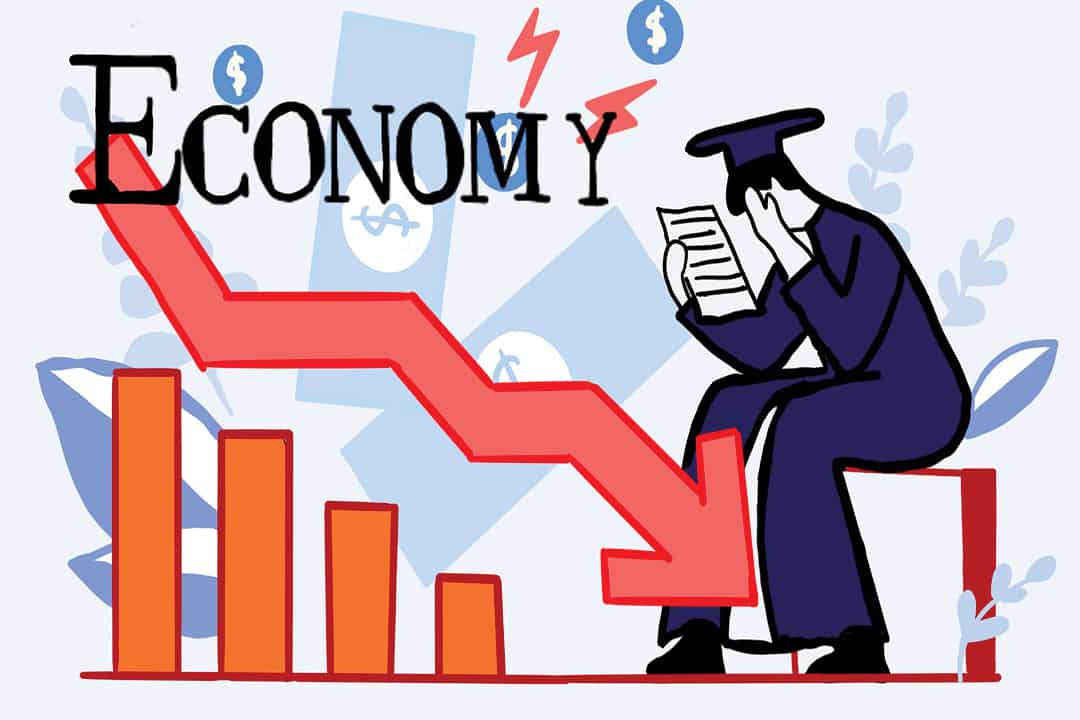The International Monetary Fund is warning that at least a third of the economies in the world are expected to be in recession in 2023 — and Canada’s is one of them. This has become particularly concerning for graduating students who are currently seeking jobs.
Breaking down the recession
The key cause of the recession is interest rate hikes carried out by central banks in Canada and around the world to tackle inflation.
Both the Bank of Canada (BoC) and the United States Federal Reserve (Fed) are not shy to admit that their policies are aimed at influencing the labour market. The BoC has advised employers against giving workers wage increases in line with inflation. An economic slowdown with higher unemployment is a choice to prevent the feared wage-price spiral that they think causes inflation. Wage-price spiral inflation is the phenomenon by which an increase in wages causes an increase in prices, which in turn increases wages again.
A recession is typically defined as negative gross domestic product growth over two consecutive fiscal quarters. However, the issue of whether a recession will be announced in each country by national banks is more complicated. Such an announcement requires considering various other factors, like unemployment rate and real income. Regardless, the likelihood and severity of a recession in 2023 are very real.
Recessions affect employment rates
Those who graduate into a recession will have a harder time looking for jobs because a key feature of a recession is high unemployment. Studies have proposed that graduating in a recession can have a pernicious, lasting effect on careers.
For example, a study by the Royal Bank of Canada found that those graduating in recession were less likely to be managers and had slower wage growth. A U of T study also found that graduating in a recession had a substantial cost to total income, with workers generally settling for lower-quality firms. A higher unemployment rate at the time of graduation is strongly correlated with lower earnings, although this can fade after five years.
The 2008 recession resulted in a depressed labour market. Starting salaries for those graduating in 2018 weren’t much better than those for students graduating during the 2008 recession. Generally, real income growth has been sluggish since 2008, and with higher inflation, it has decreased in the last two years.
A recession in 2023 will likely worsen this trend. Higher interest rates will make the more than two trillion dollar national debt a much bigger problem for many Canadians, making it harder for graduates who plan to take out a loan to start a business or buy a house.
Federal student loans seem likely to stay interest free. However, graduates seeking further education may face tougher competition for bursaries and scholarships in a recession as funds and donations dry up.
How should graduating students prepare themselves?
Further education is a path many students have taken to avoid graduating in a recession, but this has not always worked and will be unlikely to help, since the problem they will face will be a lack of jobs, not qualifications. Most advice to graduates has been to simply try harder at school and pick their degrees wisely.
Improving your skills and trying to attract good employers by being open and flexible, focusing on marketing your skills and contributions, and finding work opportunities like internships are some other pieces of general advice. Some even float the idea of using trendy ‘side hustles,’ trying out freelancing or getting into investing to secure yourself against unemployment.
However, investing always has winners and losers, and alternative work arrangements like freelancing lack the security and benefits often associated with conventional employment. They are certainly worth looking into and some will find success with them, but they cannot be solutions to a terrible job market.
Ultimately, graduates should ensure that they are aware of the state of the labour market, and of employment laws and conventions, to best secure a good job for themselves. Unionization, or joining a unionized workplace, can also help give you a leg up, since these unionized jobs have higher wages on average. Organizing for better economic policies notwithstanding, we can only do our best and realize that our employment opportunities are not always in our control.


